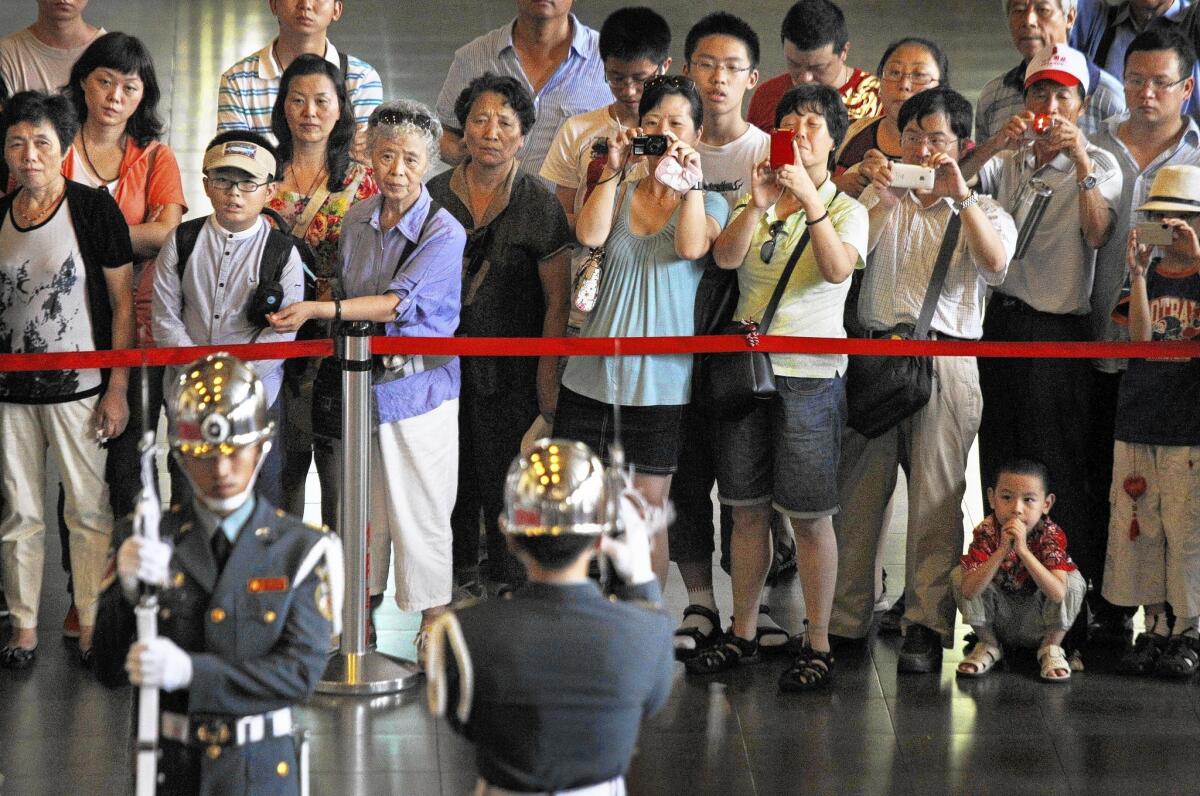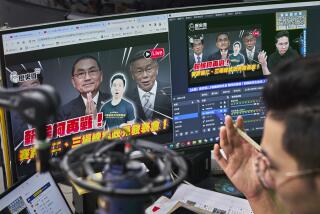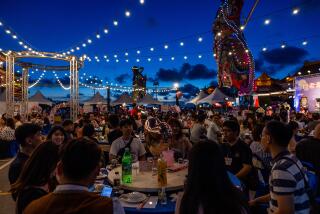In Taiwan, tourist influx points up improving ties with China

Reporting from YUCHI, Taiwan — The fog hung dense over Sun Moon Lake, obscuring the hilly shoreline that the tourists from mainland China had come to see.
Still, the Chinese crowded the main pier as a light drizzle came down, waiting for boats to ferry them around the scenic lake.
Zhao Baofeng, 54, a retiree from Hubei province, said she was struck by how well-mannered and polite the Taiwanese people are. As for political freedoms, in Taiwan the two main parties “can say whatever they want to each other,” Zhao observed.
Since the first Chinese tourists were allowed in 2008, millions have visited this democratic island, which China claims as a renegade province. The numbers are growing: The nearly 3 million Chinese who came last year constituted more than a third of tourists to Taiwan.
At popular attractions such as the National Palace Museum and Taipei 101, one of the world’s tallest buildings, the brogues of the mainland’s Henan and Zhejiang provinces are more commonly heard than the local Taiwanese diction.
The revenue, an estimated $5.3 billion last year, is a boon to Taiwan’s stuttering economy. Taiwanese officials hope that local hospitality will have an influence on the mainland’s somewhat coarser customs, and that the whiffs of democracy perceived by observant tourists will leave a lasting impression.
“They can watch TV and see our legislators fighting, then they can turn off the TV and the Taiwanese people are very nice to them,” said Alice Chen, a deputy director at Taiwan’s Tourism Bureau. “We allow different political parties and religions.”
But after decades of separation, some Taiwanese are ambivalent about the bargain.
Last year, China’s communist government issued an etiquette guide for its citizens traveling abroad, exhorting them not to pick their noses in public or leave footprints on the toilet seat. China’s vice premier has warned that “uncivilized behavior” such as talking loudly and spitting in public is damaging the country’s image as increasing prosperity enables more Chinese to travel.
Liu Chuen-tsae, who runs a souvenir shop at Sun Moon Lake, said Chinese tourists stress her out. They often try to bargain down her prices, with some storming away in disgust when she refuses. But she must deal with them, like it or not — many of her customers these days are from the mainland.
“I can’t take it. They can really drive a bargain,” Liu said.
After the Nationalists retreated to Taiwan in 1949, leaving the Communists in charge of the mainland, communication between the two sides was cut off. Taiwanese citizens have been visiting the mainland since the 1980s, and many Taiwanese companies operate in China. But until recently, Chinese citizens were largely forbidden to travel to Taiwan.
As part of a gradual rapprochement, which includes direct flights and mail delivery, Chinese tourists have descended on the island. They leave with shopping bags full of pineapple cakes and ultra-strong Kaoliang liquor, as well as toiletries, because products in Taiwan are considered less likely to be fakes.
The influx of mainlanders to Taiwan shows how far cross-strait relations have come and how large the gap between the two sides remains. Despite China’s rapid economic growth, Taiwan’s per capita income is still more than four times that of the mainland.
At Taipei 101, which rises high above the capital, Taipei, Falun Gong members perform their slow-moving exercises and wield signs alleging atrocities by the Chinese government as buses disgorge scores of Chinese tourists. The spiritual movement is banned in China, and practitioners hope the visitors will come away with a newfound appreciation for it.
Clutching a Louis Vuitton shopping bag, one woman from Hebei province said she did not pay much attention to politics. Her visit to Taiwan was all about shopping and eating, she said.
“The city is clean, and the people have class,” said the 50-year-old retiree, who would give only her family name, Wang.
Some Taiwanese are cautious about closer ties with the mainland. In March, student protesters took over Taiwan’s legislative chambers to oppose a trade pact with China. Police allowed the occupation to continue, cracking down only when a group broke into the government’s executive offices. The pact remains stalled as legislators review its terms.
Lou Liliang of Zhejiang province said he was impressed by local pedestrians’ adherence to traffic regulations. Unlike people back home, the Taiwanese stick to crosswalks, he said.
But the student protests went too far for Lou’s taste.
“Taiwan is more democratic, maybe a little too much so,” said Lou, 40, a government worker visiting Taipei 101.
Some locals said they avoid the skyscraper, with its 91st-floor observatory, high-end stores and food court filled with Taiwanese specialties, because of the crush of Chinese tourists.
Jace Yang, a financial services worker who was finishing up a meal, said he was there only because one of his lunch companions works in the building.
Yang, 40, said Taiwan should not open up too much to mainland investment or it will turn into a “second Hong Kong,” where residents fear that China will influence the political system and where an influx of Chinese money has sent real estate prices soaring. Yang added that Chinese people need to behave better, for example, by waiting in line and being cleaner in public bathrooms.
But with 23 million citizens to China’s 1.3 billion, Taiwan must embrace closer relations with China, Yang said.
“We need them, yet we don’t want them to hurt us — it’s very contradictory,” he said.
More to Read
Sign up for Essential California
The most important California stories and recommendations in your inbox every morning.
You may occasionally receive promotional content from the Los Angeles Times.











